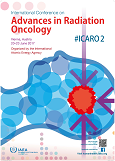Speaker
John Kildea
(McGill University Health Centre)
Description
**1 Introduction**
Incident reporting, investigation and learning are core elements of quality improvement in radiation treatment. A programmatic approach to learning from one’s mistakes, and the free exchange of this information with others on a regional, national or international scale, has the potential to improve patient safety by preventing incident recurrence or propagation, identifying and correcting system vulnerabilities and promoting a ‘just’ culture of transparency and sharing.
The Canadian National System for Incident Reporting in Radiation Treatment (NSIR-RT) was developed over the last three years and is presently being refined as a collaborative initiative between the Canadian Partnership for Quality Radiotherapy (CPQR) and the Canadian Institute of Health Information (CIHI). As an alliance among the key national professional associations in the delivery of radiotherapy in Canada, the CPQR is well-placed to provide the content expertise and community-level representation needed to ensure usability and utilization. CIHI are an independent not-for-profit organization that manages Canadian health data. As such, they bring to the project their technical and data-handling expertise as well as prior experience from development of a reporting system for Canadian medication incidents.
We describe the development and refinement process for NSIR-RT and the results to date from a pilot deployment of the system.
**2 Methodology**
A key objective was to make NSIR-RT relevant to all radiation treatment programs in Canada regardless of location, size or practice orientation (academic vs. community care delivery). While participation in NSIR-RT is intended to be voluntary, development and refinement of the system was structured to motivate uptake and utilization by broadly engaging the Canadian radiation treatment community at every step of development. Figure 1 provides an overview of the development and refinement process.
**2.1 Development**
A process of community engagement and consensus-building was used to design the elements of an initial minimum data set (MDS) for pilot testing of NSIR-RT. A total of 27 participants, with pan-Canadian representation and inclusion of all three professions involved in radiation medicine, took part in a modified Delphi study in Quebec City in January 2014 during which the initial taxonomy of the system was defined. A subsequent inter-user agreement study incorporating 32 experts who classified 20 example incidents was used to glean alignment and areas for adjustment before development of the MDS. The MDS was subsequently incorporated by CIHI into a secure web-based reporting system and released as a pilot study in September 2015.
**2.2 Refinement**
The pilot study concluded in October 2016 with a survey of users to gather feedback and suggestions for improvement. A group of expert users met in November 2016 to examine the pilot data and the feedback received. An upgrade of the system, to incorporate the changes recommended by the expert users group, as informed by the pilot survey, is currently in progress.
**Results**
The final incident-reporting taxonomy that was used for the pilot study comprised three incident types (actual incident, near miss and reportable circumstance), six data groups (impact, discovery, patient, details, treatment delivery and investigation) and 37 data elements with predefined menu options. The incident types are defined as:
**Actual incident** - Any incident that reaches the patient
**Near miss** - An incident that was detected before reaching the patient
**Reportable circumstance** - A hazard that did not involve a patient but that has the potential to impact patients if not corrected
There was high agreement about the final suite of data categories, and broad alignment of these categories with the WHO-ICPS and other American and European radiation treatment incident classifications. During the pilot study, between September 2015 and October 2016, 22 radiation oncology centres (almost half of the total number) from 5 Canadian provinces reported nearly 1100 incidents to the national system. Approximately three quarters of the participating facilities provided direct descriptive feedback regarding the system.
**Conclusions**
The Canadian NSIR-RT data standard has been implemented and tested as a pilot online, web-based incident reporting and analysis system. The pilot study is now complete following participation and feedback from almost half of the radiotherapy centres in Canada. A process of refinement has begun to implement improvements recommended by an expert user's group based on the feedback of the participants.
| Institution | McGill University Health Centre |
|---|---|
| Country | Canada |
Author
John Kildea
(McGill University Health Centre)
Co-authors
Annie Walker
(Canadian Institute for Health Information (CIHI), Ottawa, Canada)
Mr
Brian Liszewski
(Odette Cancer Centre and Sunnybrook Hospital, Toronto, Canada)
Crystal Angers
(The Ottawa Hospital Cancer Centre, Ottawa, Canada)
Erika Brown
(Canadian Partnership for Quality Radiotherapy (CPQR), Red Deer, Canada)
Jordan Hunt
(Canadian Institute for Health Information (CIHI), Ottawa, Canada)
Kathryn Moran
(Nova Scotia Cancer Centre, Halifax, Canada)
Logan Montgomery
(McGill University, Montreal)
Michael Milosevic
(University Health Network and Princess Margaret Cancer Centre, Toronto, Canada University of Toronto, Toronto, Canada)
Spencer Ross
(Canadian Institute for Health Information (CIHI), Ottawa, Canada)

